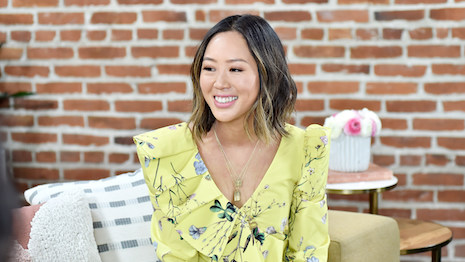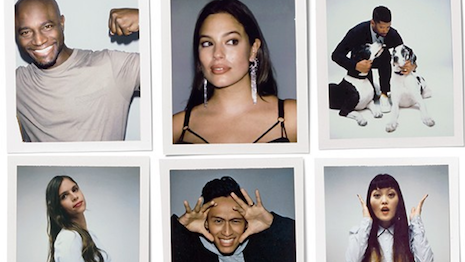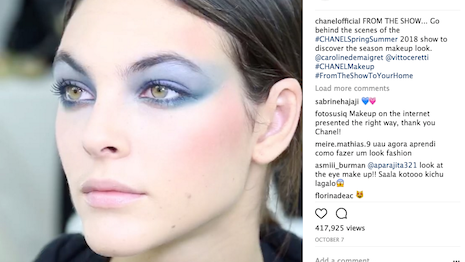Beauty marketers have been early adopters of digital and influencer marketing, which have now proved to be effective for 98 percent of the industry.
Eighty-four percent of beauty brands have claimed to work with an influencer online in the past year, according to a survey from Celebrity Intelligence. The report says that for every 1 pound, or $1.34 at current exchange, brands earned 8.81 pounds, or $11.81, for an average positive return on investment.
“We have entered a more considered age of influencer marketing where beauty brands are looking for stronger metrics across each social media platform, to help them differentiate between the influencers and celebrities who are achieving the highest levels of engagement, and ultimately delivering the best ROI,” said Megan Falconer-Taylor, director of product at Celebrity Intelligence.
Influencing the beauty industry
YouTube has been dethroned as the number one source for beauty promotion by Instagram, according to the Influencing Beauty report.
Digital influencers have also replaced celebrity spokespeople as the top preference for collaborations and partnerships. More than 80 percent of brands believe that these influencers are vital to appeal to millennial customers.
For upcoming projects, 83 percent of beauty brands are working with influencers as their top choice.

Aimee Song, fashion influencer and founder of the blog Song of Style. Image credit: SK-II.
Transparency is also an important factor for these brands, particularly as Gen Z gains more buying power, since this age group greatly values this characteristic.
Choosing which influencers to work with has become more technical, as artificial intelligence makes data analysis more sophisticated. Seventy percent of survey respondents claimed that social media analytics was the most helpful strategy in discovering the best influencers to partner with.
Sixty-seven percent of brands believe that a data-led strategy is the best approach.
While the ROI is effective, beauty brands are more concerned with brand awareness rather than sales when it comes to influencer marketing.
Social media engagement is also becoming more important to brands as a term of success measurement, rather than site traffic and column inches, with 80 percent believing so.

Nordstrom selected six influencers to act as anniversary ambassadors. Image credit: Nordstrom
Marketing budgets for influencers are set to grow for 70 percent of the beauty industry.
These findings and beauty brands’ behavior are showing the dramatic shift in the sector and how the industry operates as a whole.
Additional insight
Aside from having an engagement benefit for brands, influencer marketing could also lead to sales, according to other research.
Many luxury brands have adopted influencer-marketing strategies, but it is not always easy to connect partnerships with personalities into conversions. A report from Olapic proves the commercial potential of these content collaborations, showing that 31 percent of consumers have bought a product or service because an influencer posted about it (see story).
Seventy-eight percent of marketers working in fashion, luxury and beauty report leveraging influencer campaigns, marking a 13 percent increase in the past year.
According to a new report from Launchmetrics, brands are also investing more heavily in this tactic, with 60 percent of marketers expecting their budgets for influencer efforts to grow in 2018. With millennial and Generation Z consumers driving much of luxury’s growth today, influencer marketing has become a key component of marketers’ outreach to these digitally-native individuals (see story).
“I think the report findings prove that when collaborations are well thought through, there is the potential for influencer marketing to deliver ROI that easily surpasses traditional forms of advertising," Ms. Falconer-Taylor said.
{"ct":"PPVYSofE7dUeHPoF5EsxrGPvaB\/aPfzU9f8i0lWs4ASEqkIAl97P3iMWVTZ6171wOTjSG+orTiX8wwE1IiV9jrr4AqG1+86dNGhclOGuxcsJp6yTisslkazU67Eb9P1cZnYnLNDt4a\/eg0take6K7+6bIh3VtPJY\/HghXryg2tllWK7dCyRZZYXwI2AQlQPLF19GaeoyU9XUdyjgWB3WyLXyihjK0rsZoQWV14Srl8D5v\/GGwkIL9gDmjsB5m61tDqPTecLW7zw5PO+rqINV19s+uxKf0PMGkQr9DpZfZsh+JOljOllPzt0crDii4Dh6RylarQ92yX3W+pQmlqjt7xXzo348AVzgHjSDpLTxp8VTv0AuwdmSg1D2zZyXDzBNvP1N70wTq8TSz78+brDiRPr4e6rWHie6NebZWBcT06yYFTx6hUU0AcXUeODxUswbpPUut8nkyNBFpqshWxKc24kLbGi7sFBMxgWwyH4xSLsKBSt6lt+1phJBvyRK+jALinEzNTxQPoSHzYwhZ+vNRP+Z\/oBXN3Sxz7uSeasU4tCSkHBWKB7T4IqLjiccVSCM\/ioZI2gWehGiIbHnVo0t5H+009wIwK+kizyATWIujyentq6KHOZzciAmDE3EjiQF0Ag1mwY8KihfWgOYzJsUy1ZJoJr7qvQ05dnl1n0GP4fTrGlq3ZrHgh8jQpvS43Nr+RQV34F8fiWlr11lf\/6+gGRIeNoibbmq7LZ92fgoGrw0pRR3hf1l6kiQ42wVQaUCx2pcRMcm3ztGOH5pwRSIx0bbH+qGfDHKm4B9Rs+1OxyslMx6Zo7LrpaxGaUJ5PdFyv+DBJi7Gh4bFRIY3eBuZ558llryQ91nhZBqX1vtDn\/A6DmkQ0u9TfkkPY5pbILC5khRWpQXIvYdMPINz96LZzXf1EN60NshQ+maWWtmeqGvO11Z2KxoGz2NmlS8kjO2DCUmQP\/0grnwcpcdmIXCxnDoj\/3yWGspTAQA54PWxDuCBCEMAhi0iNKrrFo\/yyA8x4e+dqYS\/YEBky22CymylCRJWgaG3cOC0Q0vXF20BOiDJLTasl6jwnNC8HQhlLcaCF3TNtuQcSOUVagR7RYsDBCnFmryH8kp3KBpyrG13\/HRI1G5ofaAnhOEPIMRatGhtR+GzvjusUJB0QfaYf7uGXWz+bah2CaPqXf8UBTW8jOxTxwK8mWphacw45KVy8pC2CIG+fn5siU8U8jQD3CfSB49a47\/MZ+plxiRK8B6HxwvwR6ac1iMlM1qXUcf7cZWeeRDo2c+t+bPIocQPzqaDQIaSL1PKBTQvi6MptGvWZXvtlZoPeicOwK4pcWQKdiThrPkszF2leVy1R8\/jbnikPWArhU1tESkv03hM05ipPWq0aZXbVsUKX\/puLCwlfgM1l02XwZDggHYOsaY5B7axo0i9o4ndOhPqFHsT5mvaH0+u3n+fyHUqrmEJVcE37ZhH2zhydfXmUgnAgBe9N8VBX\/orj+j7erzc1heW3aFafH5l\/FEh\/3Z6t7rIcwlDScbJpnppz9bFc+pFV67Ehum3rK2leJIPwyp9Q3TTVGrcWJzhwHTE831CXZ7hsx\/l6AAZL5E8gtuwX6inYFgSEVqywJOVDETSFB3kGyYZMzETIRgPYf50+XpjXYHyyPbUok3EM6MKuTni5KiqACt1XeWsQHn4CivxInUDHrZQzXCaZKXFImNbCR+JFkP0oaYFoCTRNADSyph+hOoNitaXFpdXWHohrviPKdCn8q7PWYcWpBlC8G4f82\/fkH5qwPZ0BPnv4d\/jkFKzSA54KjcFtJCDZkJxuYIfOD66Lc9+\/ee0lgnH5Z1Qxti4iT+H4\/zMx6bg+rR+ZTbJv5M\/\/2Wpbrnsd53O+KdaafXxjEu9Vftt+LdSskLW\/8kl1A+xs7lJyi\/+FF2xyw+XDeci\/CVtS6BXn5ZwSHv\/wTddvwIKourh7Z51k+kUR0rhIxk+\/sk10m3uIqjJ9OP8AwmpmLDSGwcUo\/voNAtaTen1qy+v6VZY7Nisgqw9NVeUtvyjueof0V7MYDClW8SPfA0aM2vm0Sh0jN0Y4E9ioNX7xTR4avfpgRLpPEpJNhUenTu9SfsVxS1BZLkDZwh2K3SgGu68RmligBlpL373SE7nr1Dq4NBjrpoiC0fYK9Z9lD3uS+DLFLXerecjgJPTAaaU92ROA4H1qCyPgz5gYJQVqoI4PgenP6l9MU4MTQ65V3+bA9H4Y1b9tWzeXML8TVVSSfAyGrV\/kE8opZZ736pa9QSvn7LtJIEKoLNcVnWDK7jgThgk+l3WzpkpPrBmfE+gb1ID8bwqjm9842v7ebiQEFRCBfUzTZsDB0ugHh0XgXGCSFyVI9WSCndGOGgKOSuWRcER6FhAV\/5g8Rly15qRzgjwLr+qPM1yrjeNnU\/nE0iOaWDFrtNSm4mpovuykDcJFTMscmH05+I21Nq0V3kFQX0NwtgDoSdNyQ2FQYwN7o+xnoYoU+np8AQjNpglgSxSpjMuYLA24L2kHjD0ZYxhP6aHKyFqQ9QX6+hTLJyQP+YXHSocpK0jjsAT9gVpIR\/UseWbtL76yi13UWsM22qBqGHMsS4GGxUTIRfIZ1V4yWm4pPYLL2GoG0Qee42DjujzquufF8P5gAF7Vq38bBpT6b1iwkoDCHHxrXvzY4yGYLJx93xgGCv4znEpbPSI4sjqZfA\/K6BcAxrVVHQKAhqnUM47peNVqpfkb8pHepCAFJrMG+gItOdgw2\/54X6B1JKbxAqDGlZom3oiyGUzIT6jv60S7PknHdRX90Wp4qu17S9G3QYJdJHjIoRSeET+htlJ4FfBHFDN8O1X00iRwAu0sNlrU\/7CzmumoNhm6N+yZeKTYnii7xI3M\/JiWcrvQ\/5ZtJgpSqKlahU2DNZGr+pUY25rpkWP3M2zaQpbmo6hwnZYwugaVio1IYk8eFibdZ9sJSFyy4lUQnX6tunUe7bSg1j9N5vkoo0eigv2V8lwuVihsqEXe9qONSF1zmPb33wO1nnOw0\/beIgU6q\/f9\/Y7dY5nHvFtcw4c1ZUPu91wKZSY9IQHtteSkzSs10jF+p2ho3wJxe0QKFnVa7NBSr3s1tHvBeIJ+TdthBbqAtbXdmrSOcr4PBu4EqCddc9q0MvJSVMMas6GVim8csTP3y80P5d0SjMFPPrdC5t5lai8XWi9F8lfSZv0EeQtVixD40\/BbY4H0pHf98Q1FdIxMCFJznUw96\/iGCcAUM3PGNYIAp1OnHMiZMNN9VEcSOZNoFq83lOffw9tA7a4mH9ENjxRhg+4RztAEZk8TkUrLdDUdX9otFyg1gcTEgY982Ctk9Ta+uZiQSKsKsDyIvZ5rn06c7wpTbUiEcUBq85igtAw\/1K4P83bk103UliuxhPc7N3vtuHp9aXUZCu8EPBQG1gDTATUPTkARPbhPc0q9jWff6c75EBUvYmbQnwDQo\/aYVUo+AFLFvBhIpi5AJU3kdP1Go3Okj9GEpxPZwF8TogclvGWTdX9XLQ+65XOM2JBUo9gFZZlonqpZzpFPz3\/THfp3lRTgJIuIqPwD\/pzywY+JJYBrroM4Ewor6OnCkZgpxkeR7+eIMcq+3lvXNLQPwVy7n7mbYsjHAnnz8VYEzz7NWw2IzeLrUlRA7H96CaWn8miClItjHd+21ZCkyy4fgkxWN4iT1NVNiwa9l1G5F8M1rX1UC2vMIkSDINGoFK1pEtOKyQm39erCx0WQBXkSp2ZD1HpNflQXeia4+kGNrpoR0wyu9Xd3h49Il7xFjlQuxFlbV9OGQR1AUAqMj06f5nZ+TRROkEDg5PpnpdD29ab9V3+2UNC94BuDB5PuDRvp7YYeQROmRus7kYg\/mshh7wiX1XyOUngFtA3eS8f3Y0\/F3f7gcnzdQ6OtHqjj7i1tHAubuuQ4qvYYHyyFTULDh8zA2GxaJJykA4IV8z4TM0qYbymLkY3jECxZY5CiyjdqqBf2mmef+0TkkUzGEfkfemWsMP7YRD2Jj7qFdjDo8OjqfXr6JDrBgHtDD4UvLh4UTVSHkISvDiv2\/m17K0ZxhmIxfOxm5U5jRgAUhKXvhd\/VoxVf3A5XSXYXVbae2kcSPrzLGLNr2RVJenxM\/BziuBYizppETjbzU2YesyiIqZK\/er2SFDwyHRQB1CYr2\/e17ut9jtjo7KmB0idD\/qevW+koD5Wi9Ux1k4BksOAVzjrZ36pZt9j9cMw1ABJ6nD5pffYbrE9A7Tpmyc88aK6u1yNLPRWKAVBgJlFp3aLOoEhFEFMcNUTNjBpqoigpwUVbUbe+mNeAW13SNw9EIl6iGqZGLooeRi7RlpBBnIEwBMb5lMjn9QE22xLugXFb69itsfWnbY30p7bHdKlg2uOJ7gLlY5HNfqpwoavEeYDspj7fkadknUvycxjHghK0lwG4OBhzQ577t6z7xg1qNayrk8OSrOd5s7vfacyK7E9RX3dhW4z4kPecXEGU\/4XYd2KBXuZ7MU0xqxwyaQSYbO9L4lPDZ2hutDH8wmT7nxLt2e3bXt9KdimB0B2lac4DnOegMz6bS4vEYDjzgp7m83O\/ZFr7kMxwp4\/7rYBn4qznzqYmK74PX6RT9Qf7pb9GCARyZOTr9MuGZ+ZxblYeznFwuqhiZ1jVbDk04FPo1Qiwmdj8as1OdyLqYRQFAnMr8n08XrnyC6MwrvzryFhZgTqWcFG0UoG9HzMd2EI9BgBuNKXwRf8qxUMtaXF1vKR\/PrGocPS6YE6tk43lxgqY8CL2vHJ8S7qa9JrWnaAwcukSfsh9DEIBo6SeqIo7utCHWECbgmutRmg\/pZXeDGv5vkn2cqoFn9a+GJMG9drB+\/Z9K7QFxUh08Oikwslxxnzo\/pRSCPz2flFPkJNoAwAWvjPtMpkavIooxuEbZ4\/SVuUBKdOxp1EZ9\/kozx1htXP0XDr4ZQ47E50aVvy27IwzvMmkyu13WqAseaxaByiwVf6xg9sQxByeaOJOIIgUEMJ4Oh63cD1VKFuoV5s+jkCc+Oug0FOKMUlCv5910QSjG185YtvC408CGUESm+FZueCxwZ9m0yLgDpW6K4SkJQI0br43aAZC+scdFS9NUObm5yJ5rgGiZb4Qxm3502u1s4uAu+Ae6ZXbqmEXjDcsm92RLbIANbc1MYf9RO5\/l3C3pj3CEEHxPIeI6E5oaGFhKoO89HmZ9ppGUYtyYf0I\/ttUIY1QiLCQ43CsUIJNxFr6pwycdA\/W0i+cIElbiYd7Q5oWs86U7VKNXb57YO1wj2QzDWi8LfoJaYyJjKKvZbrFKfYlnv8xZRX\/+oyYsqws1yqRjDtso3A6e\/1tsqad+0q9zSFvQ2VhLwL0I6pOCAiUqailiUeDgISnv3KseofcDS0IZh85bQ8qi\/9drfbcwJT0hpeZLimksmdzvxkQy2kd\/\/Xqk0ODWXHwEt7TdyeV2EfFOLxAn7c7T9I9ihI2y5eUKjA44LbWLDrbleyZplqtRws\/3AHFnpzapVeLgHmaXKQQB+Ck6YbSIX5fPne4\/JiLrZ35PGm2OWlpfbTEFQCjhDmgosLb\/bbG9aj\/\/BKw5rD2fGldoobGb6AJBezGbcGEKmyRymGInFfWVdjdENLC1wwsmZWLIF6feI8Se0Vj3x3RD0k9wiKeExJjGtyQnfDIyQu8YbDk4IcQ+\/aazPlYOtxVqA9sci7zz7owBwrrBroBGy5oVeSktObyp6qgftnvwW\/99zZb++KUQm0TuMraSPeEuekwUIHujpqGjNWBQJAEW8i2u4KBQ\/+3tTY0RTE3FiI0bGdDDhkPY4Wb4JdehKzSH0C5ASVO2SL9T2tFtl3uIsRNdOkrSpxISv7cxZscNjrk73WKTn+aPiNksSgtG8n1Ggv9b9p1F1a9TNlK+E+UOw19CXm2axjn17FX8bBp5N1Zf8h65ICvSe7ectzF+VYmnNd4nyinggAPbe\/Glqu\/t5FPb3md+kqgWR5h8X1b4k9lQHseRxuLa3giRaxvaE\/pkpWZ7F19IMXMX5bKB8jxd7vruO6eOqp0uIdMsWD36Va\/wzcPyG51IvxLPFGvE+psgG8ZP2j8W1VdzrjbJlR00x2\/2Cb2EclukDUju7m2AG9FYa+1RAiNj\/YGGq1dAeNzXvwkWhEahFUKhO\/zUnt\/nCXyo5YB2HBUqpYnh9SuQ+RwI\/rh0GCw7kcbFamW0+KDzzaC4h6bydCGyk5LRLGe3lGV+nZeA8Ipo5U4K99OOXYERrA\/1kjHHuXCaDLwEM+51jEW0OefI5gHoqev9RnaGqrDy4RoAWZ2GZqHp\/W1JQWKQ4ezc75FsOTuCZAgrZDCxM6FsHeE3Cju0aPqD+byppXaV4yNO+NblecUjHIIEtzWhTzVknTV+XO6+VgNukt2Ls2H0m7+ssH1Xw4HL+kNyAHS85nIE0DbRKYBhUlSKoxoYZPpQcvzYPCwLff4INIfXzaEKw1Ey7DX3G4Nknn9h1as1Rpd9jvY1JPul2\/42yZ8VIxQb8H0Vj9jNfIY7rOKK1vEv4NyBhkQMUaI48kut5\/HMK1dZ5\/e7ls+y73ePHQsDaBAKNhx+PDRVbE7VxwIJmWimzxsf935+Has+ify1DW2RowgXGTQB8MSkobGftXrffcm1kEJypuqdMUOE9oe4FCgpAm2wkeCOSnAQN2xteUgXsaSmxxcnwNXiN+ESVcUqmZ4oLBdJTYY3dmAczKAFJHKo+gSdyJsk986snLlYKg5z5c2kDW7Re3eYpeAVNu9w36QsDHOshdFXpKBwL8uB\/BVOHdN8ODnxdgJAM3YFfajOJAlhWXYDgViCcfIVMC6QZ63AU5+FTlGfWEtI5GFYt\/3KKXTF7mzYXOfboMetzC1Ee1dDWwg\/Yt1\/So5Z1tTNN\/\/RVvdQyec+lz4+ESMO9w4tbXuulG6nmQ3TMcI8aHchnC8p3qKAlIwxK0vr3+ofhJJabu9JKDTbOtB3tJCDzattoLAigtcQtIJVZ9xmNdJDNxH0w+WDm2nqfDhuWFUwIdJtS0xbgYTSfEzY0AYVzr+4tA5Q7KSriQk8KZVG5u6U3BIdRiGjzpQK9jVDNGixSA6gTfQbcOMVEicF1uFQDQvfSodj3929KeqSYvbSGWDnRUkjtAxA2Fw==","iv":"4fa98c85ca72d07f35572bfb2025b442","s":"77bab116f31cc405"}

 Chanel appeals to consumers with massive reach through Instagram video
Chanel appeals to consumers with massive reach through Instagram video